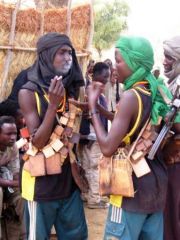FEATURE- Darfur hopes dim as rebels demand power
By By Andrew England, Financial Times
March 16, 2005 — Two pick-up trucks packed with young rebels wielding rifles and rocket-propelled grenades zoom around a village in northern Darfur as their leaders – a carpenter, farmer and mathematics student – sit in a grass shelter considering the situation in their region.

|
|
Teenage Sudan Liberation Army fighters wearing amulets ( believed to bring good luck and protect against evil) smoke cigarettes and chat in the rebel held village of Bodong in North Darfur, March 3, 2005. (Reuters). |
The three commanders’ lives have changed irrevocably in the past two years: from ordinary civilians to “officers” in the Sudan Liberation Army (SLA), one of two rebel movements fighting the government in the vast region of western Sudan. They talk of their willingness to fight until they have gained their “rights” – a share of power and wealth for a region rebels say has been neglected for years.
Judging by the lack of progress being made to resolve the conflict and the deep mistrust between the insurgents and Khartoum, they could be in for a long fight. Since the insurgency in Darfur erupted in February 2003, tens of thousands have perished and 2m have been made homeless as violence engulfed the region, causing the US to accuse the government and pro-government militia of genocide.
Talks between the belligerents, mediated by the African Union, have achieved little and all sides have persistently violated an April ceasefire.
“We welcome peace and are able to make peace, but always the agreements remain ink on paper,” says Colonel Jumma Mindi, a farmer turned field commander. “If there’s only one child left in the SLA, he’s going to fight to achieve liberation.”
A new round of talks this month may bear more fruit, amid the hope that a peace deal the government signed with southern rebels in January to end a 21-year war will help the peace process.
But many Sudanese are not optimistic, and say the north-south deal complicated problems by dividing the lion’s share of government positions between the northern and southern factions. The rest of Sudan’s regions, such as Darfur, have been practically excluded from power-sharing.
Under the deal, the southern rebel Sudan People’s Liberation Army won 28 per cent of government positions, a separate southern administration and 50 per cent of southern wealth. Now the Darfur insurgents want their share, with Abdul Wahid, the SLA’s leader, and other Darfuris saying their region needs 23 per cent of positions in the transitional government and a 23 per cent share of wealth.
But it is unlikely their demands will be met. The north-south deal gives all northern opposition groups – including the SLA – just 14 per cent of the transitional administration, and diplomats and the government warn that any Darfur deal will have to fit within the north-south process.
“These rebels that are trying to negotiate don’t get a free pass because the word ‘genocide’ is being thrown around,” a US official says. The SLA also wants those responsible for atrocities in Darfur arrested and investigated by an international court before talks resume, Mr Wahid says.
A UN commission has listed 51 people – including 10 high-ranking government officials – it says should be investigated by the International Criminal Court.
The United Nations Security Council is divided on what action to take. The government says no one will be tried outside Sudan, and some diplomats back this position, saying peace has to come before justice. Mr Wahid, a lawyer, also insists the UN take over the mediation process, accusing the African Union of failing.
However, diplomats complain divisions and lack of structure within the rebel camp have hampered negotiations. Some also acknowledge that the international community mistakenly focused earlier criticism solely on Khartoum, giving the insurgents little incentive to negotiate. Other experts argue not enough has been done to engage the rebels.
“There just seems to be this humanitarian effort with a massive population in camps, which suits the rebels because it reflects badly on the government. But there’s been no political attention on this conflict,” says one foreign expert. “Now the rebels’ demands have become fantastic. Maybe there will be a quasi-peace but nothing will be resolved.”
The AU, which is looking to expand its mission, has around 2,000 troops on the ground – too few to stem the violence and suffering. The tens of thousands of civilians in Abu Shouk refugee camp certainly show no confidence of being able to return home.
Instead, more and more permanent structures are springing up among makeshift shelters covered in plastic sheeting. “If we return . . . they are going to kill us. There’s nothing, no shelter, no water: nothing,” says one resident.
